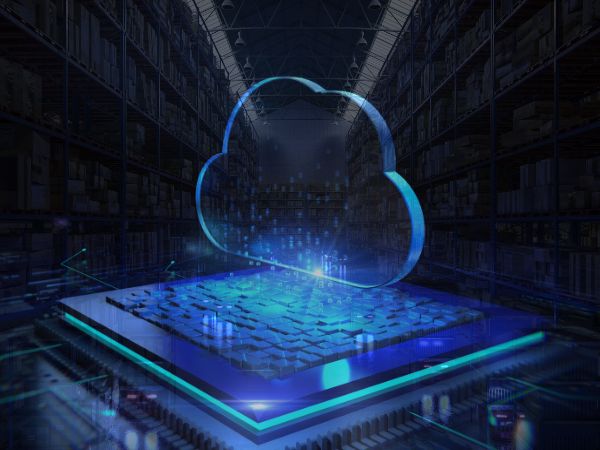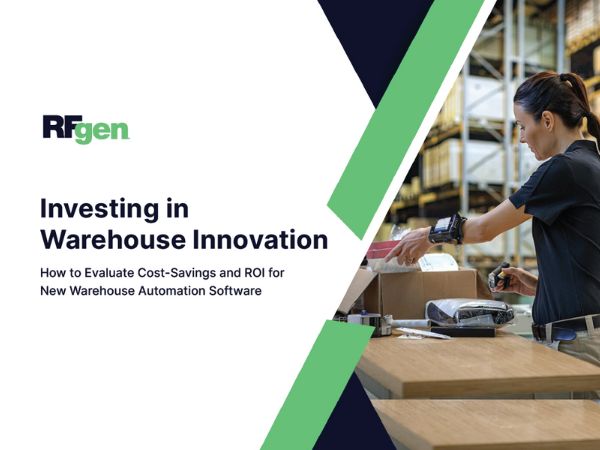Migrating from Legacy ERP to Cloud-Based ERP and Its Impact on Data Collection Software
- Data Collection
- Digital Transformation
- ERP Systems

The ERP landscape is changing. Businesses that have long relied on legacy ERP systems like Oracle E-Business Suite (EBS), JD Edwards, SAP ECC, and Microsoft AX are now navigating the complex journey towards modern, cloud-based solutions such as Oracle Fusion Cloud, SAP S/4HANA Cloud, and Microsoft Dynamics 365 (D365).
The move from a legacy ERP to a cloud-based ERP system is driven by the need for landscape simplification, enhanced flexibility, and the promise of a scalable, future-proof infrastructure. However, this transition is not without its challenges.
One significant hurdle facing supply chain operations is the prospect of losing data collection capabilities as old ERP platforms are left behind. Moving to the cloud means reevaluating barcoding and data collection practices, especially as these systems may be deeply embedded in the company’s business processes.
In this article, we will explore the state of ERP migration to cloud, its impact on barcode software and data collection, how businesses can retain custom supply chain processes when upgrading to cloud, and case studies illustrating successful transitions with mobile data collection.
The State of ERP Migration
Enterprise resource planning (ERP) systems continue to be a significant stepping stone in digital transformation strategies. Cloud-based ERP solutions are simply the next iteration.
According to Bloomberg, 48% of companies still use on-premise ERP systems, while the remaining 52% represent early adopters of cloud technology. These innovation leaders are driving the public-cloud ERP market to an estimated $73 billion by 2026.
Legacy On-Premise ERP Systems: The Foundation of Yesterday
Legacy ERP systems have been pivotal in managing traditional business operations. They are known for their stability and extensive customization capabilities. However, they often operate in silos, lack real-time data processing, and require substantial maintenance and infrastructure support.
In an age where organizations are seeking to outsource and simplify IT operations, dedicating significant resources to managing on-premise systems is no longer tenable for many.
Barcode software integrated with the on-premise ERP may be functional, but is limited by last-gen ERP capabilities.
The Shift to Cloud-Based ERP Solutions
Cloud-based ERP systems represent the next generation of enterprise resource planning. They offer numerous advantages over their legacy counterparts, including scalability, improved data accessibility, and lower total cost of ownership.
More than that, cloud migration is about continuous reinvention within existing infrastructure to reduce costs with a future-proof platform.
But migration is challenging. Deloitte explains that “even a single application could be tied to multiple business processes,” including mobile apps for data collection. Changing ERP platforms can mean re-acquiring and re-integrating mobile software altogether.
Therefore, businesses must carefully plan the migration. Additionally, it’s crucial to have the right technology partners in place to ensure minimal interruptions to your business when migrating an on-premise or legacy ERP to cloud-ERP software.
Mobile data collection software is no exception.
Impact on Barcode and Data Collection Software
For businesses facing a change of ERP, the stakes are high. While many benefits await a successful implementation, the implementation must first succeed—and numerous challenges overcome along the way.
Because a migration project of this scale is so complicated, the impact on barcode and data collection software often gets overlooked until it’s too late. Automated data collection systems are vital for effective inventory management, logistics, and overall operational efficiency.
Shifting to a cloud-based ERP requires provisioning and planning to ensure minimal disruption to data collection practices.

Investing in Warehouse Innovation: Uncovering Software ROI
DOWNLOAD NOW »Challenges Posed by ERP Migration to Cloud
When making the leap to cloud, your existing mobile data collection systems are likely to face a number of challenges. The most common challenges in terms of data collection software include:
- Architecture: Cloud-based ERPs operate on a different architecture than legacy ERP systems, requiring a new integration for barcoding solutions.
- Standardization: Cloud ERPs leverage standardized processes that prevent custom workflows from migrating with the legacy ERP, risking loss of critical functionality.
- Consolidation: Many cloud adopters are consolidating multiple on-prem ERP systems into a single cloud instance. That means multiple mobile data collection processes must be accommodated.
- Vendor Capabilities: Providers of existing barcode solutions may lack integration expertise or ERP certification for integrating old data collection systems with your new cloud ERP.
Strategies for Transitioning Data Collection Software During Cloud ERP Migration
Faced with the question of how to transition a barcode scanning or mobile data collection platform during migration, you may be asking yourself how to proceed.
The best strategy is to reach out to potential data collection solution providers to gain valuable insights. A strategic technology partner with migration experience can make all the difference in successfully switching over your mobile solution.

Get Expert Help Now
TALK TO AN EXPERT »In addition, many organizations are unaware that some mobile solutions integrate with multiple ERP systems. For instance, RFgen Mobile Edge™ specializes in multi-ERP integration. RFgen’s mobile supply chain solutions are capable of compatibility with both legacy and modern cloud-based ERP systems.
Common migration scenarios include:
- Oracle E-Business Suite (EBS) to Oracle Fusion Cloud SCM
- JD Edwards EnterpriseOne or JD Edwards World (JDE) to Oracle Fusion Cloud SCM
- Microsoft Dynamics AX to Microsoft Dynamics 365 F&O/SCM
- SAP ECC to SAP S/4HANA or S/4HANA Cloud
(Or any combination of the above.)
This offers a low-risk pathway to transitioning mobile data collection capabilities between ERPs. RFgen can help bridge the gap by ensuring that these critical systems continue to operate efficiently, even as the underlying ERP platform changes.
Solving for Potential Loss of Custom Functionality
In legacy ERP systems, businesses often have the flexibility to modify the core code to create custom functionalities tailored to their unique processes. Customization relies on the ability to modify the core code of the on-prem ERP itself.
Cloud-based ERP systems do not allow access to the core code to ensure universal process standardization. Therefore, custom workflows must often be left behind. If they can’t be recreated in the new ERP system, then that much-needed functionality is lost entirely.
One of the major advantages of partnering with RFgen Software is the ability to preserve those custom processes. Using highly efficient automation, the experts at RFgen can migrate or recreate business-specific processes for the cloud ERP environment, preventing loss of functionality or business disruption.
Enhancing Capabilities in the Cloud Environment
Challenges aside, migration to a cloud-based ERP like SAP S/4HANA Cloud or Oracle Fusion Cloud SCM presents opportunities to enhance inventory operations. Using mobile apps, advanced mobile barcoding, and software automation, RFgen Mobile Edge™ can drive improvements in efficiency, visibility, and data-driven insights.
RFgen users can enhance data collection with:
- Real-time mobile software with microsecond ERP updates.
- Live KPI dashboards for warehousing and manufacturing.
- Machine-level data collection for IoT devices and industrial computers.
- Integration of autonomous vehicles (AVGs), scales, and carousels.
- Specialized workflow automation for site-specific operations.
These enhancements can lead to even greater efficiency and scalability while reducing overhead costs.
Case Studies
Successful ERP Migrations with Data Collection
Next, let’s take a look at real-world examples in which enterprise companies successfully migrated to a cloud-based ERP system while retaining or enhancing their mobile data collection capabilities.
Case Study 1: Transitioning from Oracle EBS to Oracle Fusion Cloud
Background: Boyd Corporation, a global pioneer in thermal management solutions, was migrating from multiple legacy ERP systems, including Oracle E-Business Suite (EBS).
Challenge: The company relied heavily on custom supply chain processes created in EBS. Migrating to Oracle Fusion Cloud posed a risk of losing these tailored functionalities.
Solution: By partnering with RFgen Software, the company was able to develop new mobile barcode solutions that integrated seamlessly with Oracle Fusion Cloud. RFgen’s flexibility and team expertise ensured that the company’s unique processes were successfully migrated to Oracle Cloud.
Outcome: After a smooth transition, Boyd retained its custom capabilities and enhanced inventory operations for the shop floor, receiving, shipping, and labeling.
Boyd Corporation Migrates Custom Processes from EBS to Oracle Cloud
READ THE FULL STORY »Case Study 2: Upgrading from SAP ECC to S/4HANA Cloud
Background: Grupo Cementos (GCC), a global leader in the manufacturing of cement and concrete, is migrating from SAP ECC to SAP S/4HANA.
Challenge: Migration to SAP S/4HANA risked loss of mobile data collection capabilities.
Solution: The manufacturer partnered with RFgen Software to seamlessly transition their RFgen mobile solution from ECC to S/4HANA (RFgen offers SAP-certified integration with both).
Outcome: GCC’s RFgen mobile solution integrated with its new S/4HANA ERP instance with minimal adjustments and no interruptions to supply chain operations.

Watch how GCC migrates mobile barcoding from SAP ECC to S/4HANA
WATCH THE VIDEO »These case studies demonstrate that while migrating to a cloud-based ERP system can be challenging, especially in terms of maintaining custom barcode and data collection functionalities, the right strategies and solutions can lead to successful outcomes. In each case, RFgen Software played a pivotal role in ensuring that these migrations not only preserve essential functionalities but also leverage the advanced capabilities of cloud-based ERP systems.

Explore More Case Studies
LEARN MORE »Data Collection & ERP Migration Expertise Matter
Having a technology partner you can rely on to help you navigate data collection complexities is critical during an ERP change. Failing to adequately account for expected and unforeseen obstacles may risk business interruptions.
Mobile solution providers like RFgen Software offer experience and insights for companies seeking to transition their mobile data collection solution. Organizations that partner with RFgen can leverage extensive knowledge and a deep understanding of their ERP and supply chain challenges.
Other benefits include:
- Seamless transition of data collection operations between ERP systems.
- Nuanced understanding of ERP capabilities and gaps.
- Tailored solutions for specific, unique, and complex operational needs.
- Collaborative approach and ongoing, end-to-end support.
- Empowerment for future evolution and success.
The Future of ERP Migration to Cloud & Data Collection
As more businesses modernize their technological landscapes, cloud-based ERP systems will continue to grow in prevalence. This upgrade offers new opportunities for growth and efficiency. When it comes to supply chain processes, don’t forget to make a plan for migrating data collection as well. By understanding the complexities involved, leveraging expert guidance, and embracing mobile data collection solutions ideal for cloud migration, organizations can seamlessly navigate this change, setting a strong foundation for future innovation and success in the digital era.





